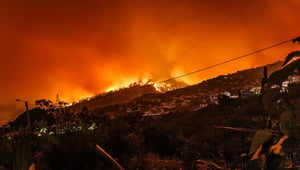 Being a landlord or managing a rental property can be a tough and stressful endeavor. Making the job even more complicated is the increasing number of risks faced by landlords and property managers, which range from disgruntled tenants to natural disasters.
Being a landlord or managing a rental property can be a tough and stressful endeavor. Making the job even more complicated is the increasing number of risks faced by landlords and property managers, which range from disgruntled tenants to natural disasters.
Are you aware of all the risks you face as a landlord as well as how to protect yourself against them? For example, are your properties among the 7 million structures in California now at risk of damage or loss from wildfire?
You need the right insurance policy to protect your assets and keep you in business when faced with expensive repairs, legal and/or compensation bills related to lawsuits, vandalism, theft, arson, fire, earthquake, wildfire and so on.
When the choice is investing a relatively small amount in insurance or going out of business from even one expensive claim, the right decision should be clear. After all, you don't want to be penny wise, pound foolish.
This quick guide will explain exactly which landlords and property managers need insurance; which general business and landlord-specific insurance policies apply; and the cost of Landlord Insurance. It also addresses the ever-increasing risk of a wildfire damaging or destroying your property.
Many of the same risks apply to the entire spectrum of property management professionals, which includes:
 Landlords who own and lease residential properties (a single-family home, a single apartment or an apartment building or complex) for six months or more at a time.
Landlords who own and lease residential properties (a single-family home, a single apartment or an apartment building or complex) for six months or more at a time.If you rent your home on a temporary basis, or if you rent part of your home such as an in-law apartment, be aware that your Home Insurance probably won’t cover damages or loss related to the rental. So if the tenant in the basement leaves the bathtub running and causes extensive water damage to your property, you’re on the hook to pay for the repairs. Your Homeowners Insurance is also unlikely to protect you against liability claims should the tenant get hurt due to your perceived negligence.
Additionally, if you regularly rent a room or property for short stays of less than six months, perhaps through Airbnb, VRBO or a similar service, you probably need a different type of insurance altogether.

Believe it or not, there are two types of insurance coverage that are designed specifically to protect property managers and landlords:
In addition to those landlord-specific coverages, your Landlord Insurance package may greatly benefit from the following policies if relevant to your circumstances:
 Building/Property Damage Insurance — Allows you to quickly rebuild or repair buildings or other structures like garages and sheds, if they are damaged by theft, vandalism, fire or certain natural disasters. Sometimes damage caused by a tenant can also be included. As with your Home Insurance, it’s recommended that you insure for “replacement cost” so you have adequate compensation in the event of a total loss and have to re-build from scratch.
Building/Property Damage Insurance — Allows you to quickly rebuild or repair buildings or other structures like garages and sheds, if they are damaged by theft, vandalism, fire or certain natural disasters. Sometimes damage caused by a tenant can also be included. As with your Home Insurance, it’s recommended that you insure for “replacement cost” so you have adequate compensation in the event of a total loss and have to re-build from scratch. Commercial property managers will likely need additional types of Business Insurance coverage beyond the Landlords Insurance products listed above. These could include Cyber Insurance and Errors & Omissions Insurance. “E&O” protects you when a client sues for financial loss or other damage based on what they perceive as your error or negligence. (Errors & Omissions is also called Professional Liability Insurance.)
Commercial property managers will likely need additional types of Business Insurance coverage beyond the Landlords Insurance products listed above. These could include Cyber Insurance and Errors & Omissions Insurance. “E&O” protects you when a client sues for financial loss or other damage based on what they perceive as your error or negligence. (Errors & Omissions is also called Professional Liability Insurance.)
These days, some of your clients/tenants may require you to carry E&O as a condition of their lease.
For a complete overview of the types of business coverage you might need, visit our Business Insurance page. Better yet, call us and one of our independent agents will walk you through the options and requirements.
Landlord Insurance policies generally only run about 25% more than Homeowners Insurance, and the premiums are tax deductible. The cost of your Landlord Insurance depends on factors including:
 California wildfires have become a very real threat to virtually the entire state. Our fires are stronger and bigger than ever. They last longer and are harder to fight. And as we’ve seen, they are sadly more deadly than ever. The number of properties and structures destroyed in California in recent years is staggering. Experts predict the situation will only worsen as the state becomes drier and hotter.
California wildfires have become a very real threat to virtually the entire state. Our fires are stronger and bigger than ever. They last longer and are harder to fight. And as we’ve seen, they are sadly more deadly than ever. The number of properties and structures destroyed in California in recent years is staggering. Experts predict the situation will only worsen as the state becomes drier and hotter.
But if you need convincing that you should protect yourself against wildfires with Landlords Insurance, have a look at these statistics:
The business of managing properties requires building and maintaining strong relationships with your business vendors and partners. Leap/Carpenter/Kemps was founded and built on personal relationships. Customers often cite this personal service as the special quality that sets us apart from other insurance professionals.
Whether you manage a single rented apartment or a large property portfolio, we understand your business. Unlike impersonal, faceless national companies, we are a local California company whose agents take the time to learn about any risks or requirements specific to each of our customers. That allows us to customize the right package of insurance policies to provide you with the most appropriate coverage at the lowest price.
And when you’re faced with an expensive claim, we’ll be right there at your side guiding you through the process.
Contact us today if you are in need of any of the protections listed above, or if you’d like one of our professional insurance agents to review your current policies to make sure you have the coverage you need.
Leap | Carpenter | Kemps Insurance Agency provides Commercial Business Insurance, Employee Benefits, Life and Health Insurance, and Personal Insurance to all of California, including Merced, Atwater, Los Banos, Mariposa, Madera, Fresno, Modesto, Turlock, and Stockton.
CA License Number 0646081 | Licensed to do business in California, Arizona, Hawaii, Idaho, Montana, Nevada, North Carolina, Oklahoma, Oregon, Virginia, West Virginia and Washington.
© Copyright 2023 Leap | Carpenter | Kemps Insurance Agency — Privacy Policy | Terms & Conditions.
Merced Office
3187 Collins Drive
Merced, CA 95348
Phone: (209) 384-0727
Additional Contacts
Toll Free: (800) 221-0864
Fax: (209) 384-0401